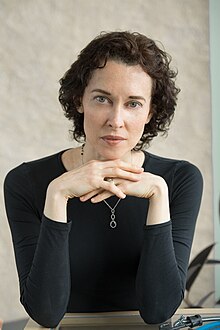Jennifer Elisseeff
Jennifer Elisseeff | |
|---|---|
 | |
| Alma mater | Massachusetts Institute of Technology, Carnegie Mellon University |
| Scientific career | |
| Institutions | Johns Hopkins University |
| Thesis | Transdermal Photopolymerization of Hydrogels for Cartilage Tissue Engineering |
| Doctoral advisor | Robert S. Langer |
Jennifer Hartt Elisseeff is a professor of biomedical engineering, orthopedic surgery and ophthalmology at the Whiting School of Engineering and Johns Hopkins School of Medicine.[1] Elisseeff's research is in the fields of regenerative medicine and immunoengineering. She was elected to the National Academy of Engineering in 2018 for "development and commercial translation of injectable biomaterials for regenerative therapies."[2] In 2018 she was also elected to the National Academy of Medicine.[3] Her research has been cited over 17,000 and she has an h-index over 65.[4]
Education and Career
Elisseeff attended Carnegie Mellon University for her undergraduate education in chemistry with a focus on polymer science. She then undertook doctoral studies in the Harvard-MIT Division of Health Sciences and Technology under the mentorship of Robert Langer. Following the completion of her doctoral studies in 2001, Elisseeff completed post-doctoral training at the National Institutes of Health. She was originally hired by Johns Hopkins University as an assistant professor with joint appointments in biomedical engineering and orthopedic surgery in 2003. In 2010, Elisseeff was named the endowed Jules Stein Professor of the Wilmer Eye Institute. While at Hopkins, Elisseeff has aggressively pursued clinical development and translation of biomedical research and was appointed to the Maryland Technology Development Corporation (TEDCO) Board of Directors by the governor of Maryland in 2017.[5]
Research
Elisseeff's current research group resides within the Johns Hopkins University Translational Tissue Engineering Center, undertaking translational research related to tissue engineering, ophthalmology and immunology.[6] Her lab's research focused on further development and application of polymer based hydrogels to tissue engineering and regeneration. Beginning with the publication of a Science article in 2016, however, much of her group's research has pivoted to identifying the response of the immune system to implanted biomaterials and how biomaterial properties affect wound healing response.[7]
References
- ^ "Jennifer H. Elisseeff, Ph.D." Retrieved 2018-02-09.
- ^ "National Academy of Engineering Elects 83 Members and 16 Foreign Members". NAE Website. Retrieved 2018-02-09.
- ^ "Jennifer Elisseeff elected to the National Academy of Medicine". Johns Hopkins Whiting School of Engineering. 2018-10-15. Retrieved 2019-01-26.
- ^ "Jennifer Hartt Elisseeff - Google Scholar Citations". scholar.google.com. Retrieved 2019-01-26.
- ^ "Jennifer Elisseeff joins TEDCO board of directors". Johns Hopkins Department of Biomedical Engineering. Retrieved 2019-01-26.
- ^ "TTEC — Johns Hopkins University". ttec.johnshopkins.edu. Retrieved 2019-01-26.
- ^ Elisseeff, Jennifer H.; Pardoll, Drew M.; Housseau, Franck; Powell, Jonathan D.; Wagner, Kathryn R.; Wang, Hao; Luber, Brandon S.; Patel, Chirag H.; Tam, Ada J. (2016-04-15). "Developing a pro-regenerative biomaterial scaffold microenvironment requires T helper 2 cells". Science. 352 (6283): 366–370. doi:10.1126/science.aad9272. ISSN 0036-8075. PMC 4866509. PMID 27081073.
External links
- Jennifer Elisseeff publications indexed by Google Scholar
